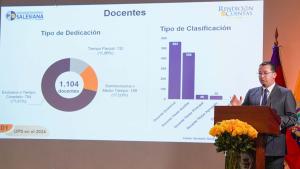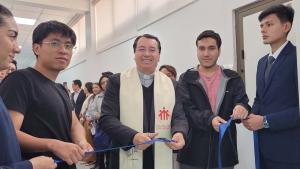Electrical Engineering - Cuenca
Important Information
Important Information
Program Overview
Program Overview
The electrical engineering program educates students to become electrical engineers who are prepared to work in the generation, transmission and distribution of electric energy with a focus on the modern world of smart electrical networks, whose aim is to optimize resources and processes. They will be capable of managing and developing innovative electrical technologies and verifying the quality, efficiency, and reliability of low, medium and high voltage electrical power systems and processes.
Approved by the Higher Education Council:
RPC-SO-19-No.303-2016


Occupational Outlook
Occupational Outlook
An electrical engineer can work in national and international public and private companies. They are ideal professionals that can stand out in management areas of any company, from startups to transnational companies. They can also work as teachers, researchers, designers, entrepreneurs, managers, inspectors, investors, analysts or consultants in the area of electrical energy.
Student Outcomes (SO)
1. An ability to identify, formulate, and solve complex engineering problems by applying principles of engineering, science, and mathematics.
2. An ability to apply engineering design to produce solutions that meet specified needs with consideration of public health, safety, and welfare, as well as global, cultural, social, environmental, and economic factors.
3. An ability to communicate effectively with a range of audiences.
4. An ability to recognize ethical and professional responsibilities in engineering situations and make informed judgments, which must consider the impact of engineering solutions in global, economic, environmental, and societal contexts.
5. An ability to function effectively on a team whose members together provide leadership, create a collaborative and inclusive environment, establish goals, plan tasks, and meet objectives.
6. An ability to develop and conduct appropriate experimentation, analyze and interpret data, and use engineering judgment to draw conclusions.
7. An ability to acquire and apply new knowledge as needed, using appropriate learning strategies.
* Approved by Resolution Nº120-04-2023-04-19
Program Educational Objectives (PEO)
Within a term of approximately 3 to 5 years after graduation, professionals in the field of electrical engineering will consolidate their work experience by achieving the following objectives:
PEO 1: Developing electrical and energy projects in their design, planning, and implementation phases.
PEO 2: Managing, implementing, and administering the operation, maintenance, and auditing of electrical systems.
PEO 3: Proposing solutions to energy needs while promoting environmental sustainability, energy efficiency, and the use of smart electrical networks.
PEO 4: Leading work teams with ethical, professional, and environmental responsibility while applying effective communication tools.
PEO 5: Acquiring new knowledge and competencies as a result of their professional practice or graduate studies.
Need more information?

Get in touch with the admissions office for more information
News
News























Follow us
Follow us